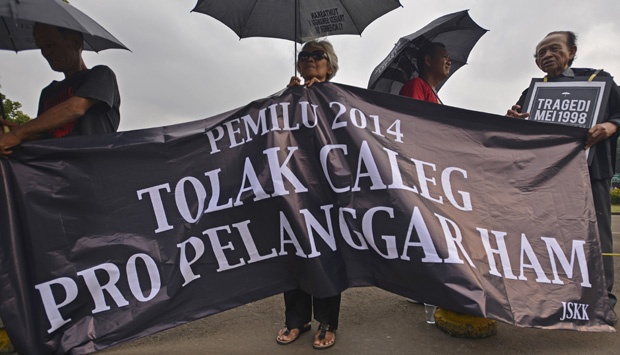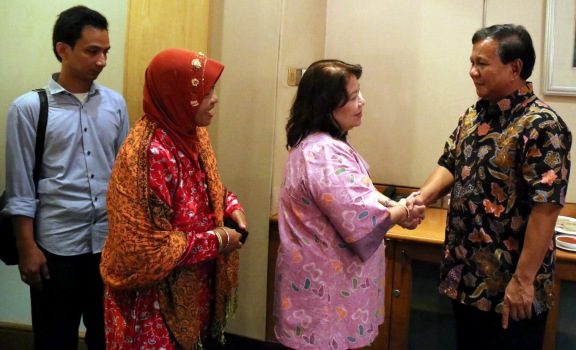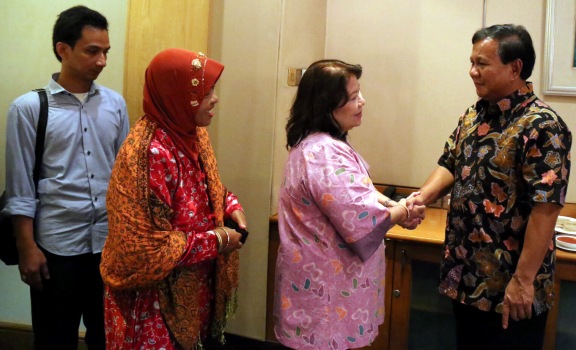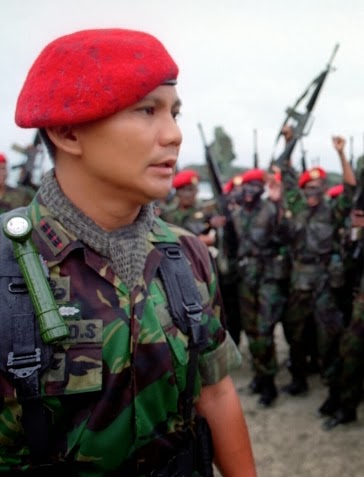Just a few weeks ago, on May 12th, hundreds of students from Trisakti University marched on the Presidential Palace to commemorate the Trisaksi shootings. 16 years ago to the day, four Trisakti students, Heri Hertanto, Elang Lesmana, Hendriawan Sie, and Hafidin Royan, were shot dead by unidentified gunmen during a large protest against Soeharto at Trisakti University. These shootings triggered the 13-14 May riots that led to the downfall of Suharto. So important is this event in Indonesia’s collective memory that in August 2005, President Yudhoyono has named Elang, Heri, Hendriawan and Hafidin as “Pahlawan Reformasi” (Reformation Heroes).
On the same day of the march, the media reported that the families of three of the Trisakti victims publicly announced their support for Prabowo’s candidacy for President. “We support Prabowo because we are convince that his ability and assertiveness will lead to better and prosperous Indonesia”, said Hira Teti, mother of Elang, a moment after their meeting with Prabowo at Grand Hyatt Hotel, Jakarta (photo below).
They assured the media that they were convinced that Prabowo had nothing to do with Trisakti shooting, and that he was a scapegoat of the New Order regime.
For many people, especially human rights groups, the announcement came as a shock. When the Trisakti tragedy occurred, Prabowo was the Commander of Army Strategic Command (Pangkostrad), a special unit of the military that specialises in strategic combat and was deployed in 1998.
There’s no evidence that Prabowo was involved in the Trisakti shootings and in fact, there were so many different military units on the ground, operating autonomously, that there’s grounds to argue that Prabowo had nothing to do with the May shootings at Trisakti university and November shootings in Semanggi after the fall of Suharto.
However, Prabowo’s name is among the list of names recommended for further investigation in the report by the Joint Fact Finding Team (Tim Gabungan Pencari Fakta) for abuses that occurred during 1998 Famously, five days after the Trisakti shootings, Prabowo himself visited Heru’s family and swore on the Koran that he was not involved in the shooting.
Prabowo is keenly aware of the significance of human rights to his presidential aspirations and has strategically maneuvered to accommodate and coopt potential spoilers to his candidacy. Four out of the nine activists, Pius Lustrilanang, Haryanto Taslam, Desmond Mahesa and Aan Rusdianto, who were disappeared and then returned by Prabowo in 1998 have joined Gerindra, standing as legislative candidates.
He has also apologized to the Acehnese for abuse committed by Kopassus, the Special Forces once under his command.
Prabowo has not been directly linked to abuses in Aceh but he was there briefly in the 1980s and Kopassus, the institution under his control, was responsible for killing and torture during the Military Operation period (DOM), including establishing the notorious concentration camp Rumoh Gedong in Pidie.
Prabowo, through his campaign team, early this month also approached Sumarsih, mother of Wawan who was shot in Semanggi tragedy in 1998. The Semanggi tragedy was a mass student protest at the Semanggi roundabout where students rejected Sidang Istimewa or Special Session of People’s Consultative Assembly as unconstitutional nature. 18 people were shot in the resulting melee. Prabowo was fired from the military in August 1998, so there’s no link between Prabowo and the Semanggi shootings, asides from the Fact Finding team’s recommendation that he be investigated. However, Sumarsih refused to meet him, and refused his offer for material assistance.
Prabowo through his team also approached Suciwati, the wife of Munir, a prominent human rights figure who was poisoned in Garuda flight. Suciwati also refused to meet him in person, and tweeted “It will be respectful if Prabowo could go to Komnas HAM instead of coming to me.”
The political support that families of Trisakti victims extended to Prabowo has been both confronting and contradictory for the public. Rumours have circulated saying the families accepted money from Prabowo, as Sumarsih maintains she was offered financial assistance. Some argued that these innocent families might have been deceived. for example in this link.
But most people were left wondering: How is it possible that families whose loved ones were shot by the military can support a military candidate with a poor human right record? Some people even asked: if victims can make peace with the devil, why can’t we?

The Victims Solidarity Network for Justice protest in front of the Presidential Palace, Central Jakarta, 20 March, 2014. Photo credit: ANTARA Fanny Octovanius
Blaming Victims?
The most convenient and predictable response is to blame the victims themselves. By reconciling with Prabowo, victims are transformed into hypocrites: easily manipulated and lured away from justice with material gain. They have even been accused of betraying their own suffering. But we need to think more critically about victimhood itself and its social implications. We need to critically reflect on the way we create ‘good’ and ‘bad victims’.
Before we leap to judgement, we need to interrogate what it means to be a victim and the experience of victimhood. Victimhood consists of two related aspects. The first is on the individual level, the second is social attachment. We understand victimhood to be individual in that injustice is a personal experience and born of memories. For direct victims of violence, trauma can reemerge in daily life. For the 1997/1998 enforced disappeared activists, the experience of being tortured is reignited, for example, when hearing the sound of a walkie-talkie or smelling a particular perfume.
Trauma can affect the daily lives of family members too. Every night, Sumarsih sets a place at the dinner table for Wawan, and a waiting chair. This act keeps Wawan alive in her memory. For Wani and Sipon, the daughter and wife of Widji Thukul, a poet forcibly disappeared during 1998, the experience of victimhood has administrative implications. They cannot apply for credit schemes because they can’t provide a death certificate for Widji. In Indonesia, credit applications need to evidence the consent of the man, as the head, of the household. As much as they want Widji to come home, for the purpose of obtaining credit, in the words of Wani, sadly they have to “kill” him.
Because victimhood is personal and individualized, justice is also personal and should be individualized too. Only victims, and the family of victims, can define the justice that speaks to their own experience. For Sumarsih, justice will be achieved when those who shot Wawan are prosecuted. For some of the victims of 1984 Tanjung Priok massacre, justice could mean knowing what happened to their missing loved ones and where they are buried. For victims of the 1965-66 Communist killings, justice could be restoring the names of victims and their families and the official acknowledgement that the killings were a crime against humanity. When the state fails to fulfill these individual needs for justice, or even worse denies the experience of injustice, then the process of seeking justice can be hijacked by a third party who uses their own definition of justice, that suits his or her political interests.
The fact that the Trisakti families became fodder for public debate illustrates the second aspect of victimhood, which is that individual experiences of injustice are often amplified to become social experiences of injustice. For a social group, ongoing injustice signals the malfunction of legal systems and impunity and reminds a society how vulnerable they all are to future violations. It also forces society to question whether they really live in a democracy.
Consciously or unconsciously, in such situation, it’s often the case that victims and their victimhood are socially constructed to represent the absence of a moral good within society, whether that be justice, equality, compassion, or accountability. Victims and victimhood become a moral symbol, a barometer for social transformation. In this way, individual justice has a strong collective dimension.
But this has implications for the victims as people. Victims of human violations are constructed as vulnerable, innocent, impartial, and sterile from any political interests and society punishes them when they fail to meet these expectations.
Passive Victims and Agency
When both individual and collective aspects of justice go unfulfilled, the discourse of ‘victims’ and ‘victimhood’ discourse remain open to manipulation by private interests. This is especially so during election campaigns. Like Prabowo, other political candidates in previous and current elections have used victims and their victimhood to win their electoral battles. For them, victims are passive objects. Aligning victims in their own political camp lends their campaign and candidate attributes of goodness.
But victims aren’t passive pawn in the political process. Often people forget that victims can also shape their own agency to push for change. They are indeed an important actor in democratic processes. Many of them argue that their justice is also justice for the nation as a whole. For instance, Kamisan, a peaceful Thursday gathering of human rights abuses is an example of their agency. Every Thursday, since the 18th of Jan 2007, victims have gathered in front of the Presidential Palace. If you spare the time to join, you find their message very clear: we the nation still long for a new democratic regime that values human life and justice. In each election, victims and families of victims always made a public statement to highlight this message again and again.
Theirs is a political message, a message that has been so far taken up in individual commitments and promises by every subsequent political leader since the fall Suharto, including Habibie, Gus Dur, Megawati, SBY, and now Prabowo and Jokowi in their campaigns, explicitly or implicitly.
It doesn’t seem to matter what their actual human rights record is, political elites still have the gall to use the issue in their campaign. They pay lip service to human rights in their vision and mission statements, but don’t bother to institutionalize it in their party platforms. They talk promisingly about human rights but don’t bother to discuss impunity and institutional reform.
Prabowo’s manifesto has a section on his respect for human rights but he calls human rights trials excessive and has taken the liberty of settling violations privately behind closed doors.
Meanwhile, human rights is all over the forty-one pages of Jokowi’s vision and mission, including promises to resolve Indonesia’s most notorious human rights abuses, including the 1965 mass violence, the 1984 Tanjung Priok, the Talangsari massacre in Lampung, the 1997/1998 enforced disappearances and the Trisakti and Semanggi tragedies.
And yet, and when asked about how he would resolve May 12, he replied innocently “What happened on May 12th?”
……………
Ayu Wahyuningroem is a PhD Candidate at the Department for Political and Social Change, ANU and a lecturer in political science at Universitas Indonesia.
Note: I gratefully acknowledge the views and experiences shared victims and families shared with me. To these people, I extend my highest respect and gratitude.
 Facebook
Facebook  Twitter
Twitter  Soundcloud
Soundcloud  Youtube
Youtube  Rss
Rss 

